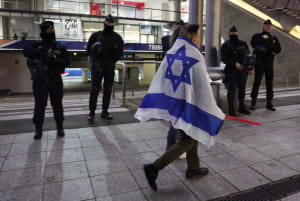Netanyahu praises Saudi hospitality towards stranded Israeli travelers
There is growing speculation that covert Saudi-Israeli ties could mature into full diplomatic relations

Israeli Prime Minister Benjamin Netanyahu praised the hospitality of Saudi Arabia towards 128 Israeli travelers onboard an Air Seychelles flight bound for Israel, which was forced to make an emergency landing on Monday in the Saudi coastal city of Jeddah.
“I appreciate the warm welcome of the Saudi authorities to the Israeli passengers on board an aircraft that experienced difficulties and was forced to land in Jeddah,” Netanyahu wrote in an official post in Hebrew and Arabic on Tuesday. "I am pleased that everyone is returning home and value the good neighborly relations," the Israeli prime minister added.
The stranded Israeli travelers appeared to share Netanyahu’s sentiments.
“The Saudis could not have been nicer,” one Israeli passenger told the Ynet news.
“We had no trepidation and trusted Israeli officials to take care of things. Perhaps we will be those who bring peace,” said another Israeli traveler, Sivan.
Saudi Arabia and Israel currently do not have official diplomatic relations, however, as a leading Middle East power, the Saudi Kingdom played a prominent role in facilitating the historic Abraham Peace Accords between the Israel and four Arab states: Bahrain, the United Arab Emirates, Morocco and Sudan.
In addition, there are growing covert ties between Saudi Arabia and Israel.
In July 2022, Saudi Arabia announced the opening of its vast airspace to commercial Israeli airlines flying between Tel Aviv and the Persian Gulf and further into Asia.
Monday's unscheduled Air Seychelles flight from Jeddah back to Israel marked the first direct flight between Saudi Arabia and the Jewish state.
In recent months, there has been growing speculation that covert Saudi-Israeli ties could potentially mature into a full diplomatic relations.
While a normalization agreement would likely be mutually beneficial, Riyadh's policy seeks to balance its commercial interests with its official commitment to the Palestinian Authority (PA). Saudi officials have stressed that normalization with Israel depends on the establishment of an Arab state “Palestine” along the 1967 lines with “East Jerusalem” as its capital.
Addressing an Arab League summit in May, Crown Prince Mohammed bin Salman, known as MBS, claimed that the “Palestinian issue” remained at the center in Middle Eastern politics.
“We will not delay in providing assistance to the Palestinian people in recovering their lands, restoring their legitimate rights and establishing an independent state on the 1967 borders with East Jerusalem as its capital,” MBS said at the time. “The Palestinian issue was and remains the central issue for Arab countries, and it is at the top of the kingdom’s priorities.”
However, given the intractable conflict between Jerusalem and Ramallah, it is currently unlikely that a new Arab state will emerge any time soon. The issue is further complicated by the internal conflict between the PA, run by Fatah party leader Mahmoud Abbas, and its rival Hamas, the terror organization which runs the Gaza Strip as a separate political entity.
A PA delegation is expected to discuss the conditions of Israel normalization with their Saudi counterparts in the near future. While the Saudi Kingdom provided substantial financial assistance to the PLO in the past, estimated at more than $5 billion, it eventually terminated the funding, reportedly due to the PA's endemic corruption and overall deteriorating ties with Ramallah.
There is now speculation, however, that the Saudis could potentially resume financial aid to the PA in exchange for Ramallah greenlighting a potential Saudi-Israeli normalization agreement. Such a trilateral agreement would enable the Saudis to enter the Abraham Accords, while at the same time officially signaling its ongoing support for the PA.

The All Israel News Staff is a team of journalists in Israel.













